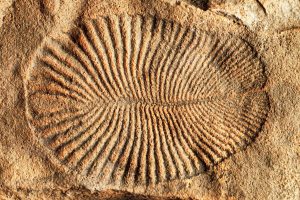Dickinsonia:

Researchers have discovered three fossils of the earliest known living animal, the 550-million-year-old ‘Dickinsonia’ on the roof of the Bhimbetka Rock Shelters.
- The fossils were found in the roof of the Auditorium Cave at Bhimbetka Rock Shelters
About Dickinsonia:
- In September 2018, an international team of researchers claimed to have discovered the world’s oldest fossil of Dickinsonia, which first appeared around 571 million to 541 million years ago.
- Current fossil evidence dates back around 100 million years from Dickinsonia.
- It is an extinct genus of basal animals that lived during the late Ediacaran period in what is now Australia, Russia, and Ukraine.
- Basal animals are animals that have radial symmetry in their body plans. They have very simple bodies and tend to be diploblastic (derived from only two embryonic cell layers).
- Thought to represent the earliest flowering of complex multicellular life on our planet, these creatures arose in a world devoid of predators and had no need for hard protective carapaces or skeletons.
- Their soft, squishy bodies resembled tubes, fronds, or even thin, quilted pillows, they bore a scant similarity to the anatomy of animals today.
- Its affinities are presently unknown, its mode of growth is consistent with a stem-group bilaterian affinity, though some have suggested that it belongs to the fungi or even an “extinct kingdom”.
- The discovery of cholesterol molecules in fossils of Dickinsonia lends support to the idea that Dickinsonia was an animal.




